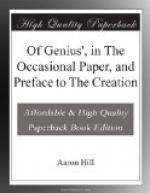Hill’s attack upon the current preoccupation with form and polish, and his contempt for mere smoothness, for the padded redundancy of Addison and the elaborate rhetoric of Trapp, are all part of a campaign waged by a small group of critics to make poetry once again a vehicle of the very highest truth. He insists, too, that great thought cannot be contained within the untroubled cadences of the heroic couplet. His own preference led to the freer, though currently unfashionable, Pindaric, the irregularity of which seemed justified by Biblical example, for despite a century and a half of study and speculation the secret of Biblical verse had not been solved and to most critics even the Psalms appeared devoid of any pattern. Indeed, Cowley had declared that in their freedom of structure and abruptness of transition the odes of Pindar were like nothing so much as the poetry of Israel.
In addition, Hill would have the modern poet profit by another quality of Biblical style: its magic combination of a “magnificent Plainness” with the “Spirit of Imagery.” This is the Hebrew virtue of concrete suggestiveness, so highly prized by 20th-century critics and so alien to the generalized abstractions and the explicit clarity of much 18th-century poetry.
In consonance with those who believed poetry best communicated truth because it appealed to man’s senses and emotions as well as to his logical faculty, Hill praises those “pictur’d Meanings of Poetry” which “enflame a Reader’s Will, and bind down his Attention.” Yet his analysis of Trapp’s metaphorical expansions of Biblical imagery reveals that Hill does not like detailed descriptions or long-drawn-out comparisons. Instead, he admires the Hebrew ability to spring the imagination with a few vividly concrete details. Prior to Hill one can find, in a few paraphrasers and critics like Denham and Lamy, signs of an appreciation of the concrete suggestiveness of the Bible, but most of the hundreds of paraphrasers had felt it desirable to expand Biblical images to beautify and clarify them. Hill was apparently the first to prove the esthetic loss in such a practice by an analysis of particular paraphrastic expansions.
Despite his theory, however, Hill’s own paraphrase seems almost as artificial and un-Biblical as those he condemns. He often forgets the principles he preaches. But even in his preface there is evident a blind spot that is a mark of his age. His false ideas of decorum, admiration for Milton, and approval of Dennis’s interpretation of the sublime as the “vast” and the “terrible,” all lead him to condemn the “low” or the familiar. And his own efforts to “raise” both his language and his comparisons to suit the “high” Biblical subject, result in personifications, compound epithets, and a Miltonic vocabulary, by which the very simplicity he himself found in the Bible is destroyed.
Another decade was to pass before John Husbands would demonstrate a clear appreciation for the true simplicity of the Bible and praise its “penmen” in terms close to those employed to describe original genius.




